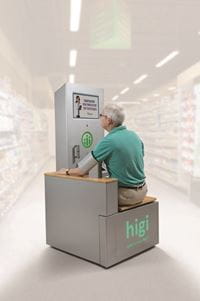Pulse, Blood Pressure and BMI, Oh My!
 The next time you’re at your neighborhood Publix Pharmacy, check your basic health data before you fill your shopping cart. Visit a BayCare Wellness Station in a store near you for free biometric screenings that include pulse, blood pressure, weight and body mass index. While it’s a good idea to keep track of these numbers, what does it mean if any of them seem high?
The next time you’re at your neighborhood Publix Pharmacy, check your basic health data before you fill your shopping cart. Visit a BayCare Wellness Station in a store near you for free biometric screenings that include pulse, blood pressure, weight and body mass index. While it’s a good idea to keep track of these numbers, what does it mean if any of them seem high?
Pulse
Your pulse, or heart rate, is how many times your heart beats every minute, and a “normal heart rate varies from person to person,” according to the American Heart Association.
The American Heart Association notes that if you’re calm, sitting or lying down and aren’t sick, a normal resting heart rate typically would be between 60 and 100 beats per minute. However, if your heart rate is lower than 60, it doesn’t always mean you have a medical problem. Athletes and people who are very active often have lower heart rates, and other factors, such as taking certain medications, may affect your pulse. Beta blockers, which block adrenaline, typically make your heart rate slower, and taking a high dosage of thyroid medication might raise your pulse.
Blood Pressure
Hypertension, or high blood pressure, is “when your blood pressure, the force of your blood pushing against the walls of your blood vessels, is consistently too high,” according to the American Heart Association. It adds that high blood pressure can cause damage to your heart and arteries.
The organization has recommendations for healthy blood pressure ranges (for example, 120mm Hg/80mm Hg)*. The upper number is systolic pressure, which happens when blood is pumped out of your heart and into your arteries. The lower number is diastolic pressure, which occurs as your heart is resting between beats.

The following ranges cover healthy and unhealthy blood pressure:
- Normal: Systolic is less than 120mm Hg and diastolic is less than 80mm Hg
- Prehypertension: Systolic is 120-129 or diastolic is less than 80
- High blood pressure (hypertension) stage 1: Systolic is 130-139 or diastolic is 80-89
- High blood pressure (hypertension) stage 2: Systolic is 140 or higher or diastolic is 90 or higher
- Hypertensive crisis (call 911 for emergency care): Systolic is higher than 180 or diastolic is higher than 120
BMI/Weight
Body mass index (BMI), which is your weight divided by the square of your height, is one screening tool to estimate your current weight in relation to your potential risk for disease, according to the CDC, which adds that higher body fat could lead to weight-related health issues. Other health issues can result from being underweight. However, the CDC notes that BMI is not a diagnostic tool for disease risk and that you should get other health assessments from your doctor to evaluate your risk for disease and receive a diagnosis. The CDC has a BMI Calculator that also provides a chart to determine if your BMI is in the underweight, normal, overweight or obese range.
Create an account at any Publix pharmacy Wellness Station to track your changes. Share your numbers with your doctor and discuss any questions or concerns about your health data. To request a physician referral, call 1-800-BayCare (1-800-229-2273) or find a doctor near you.
*There is considerable controversy about blood pressure ranges. You should speak with your physician about what your optimal blood pressure range should be.
